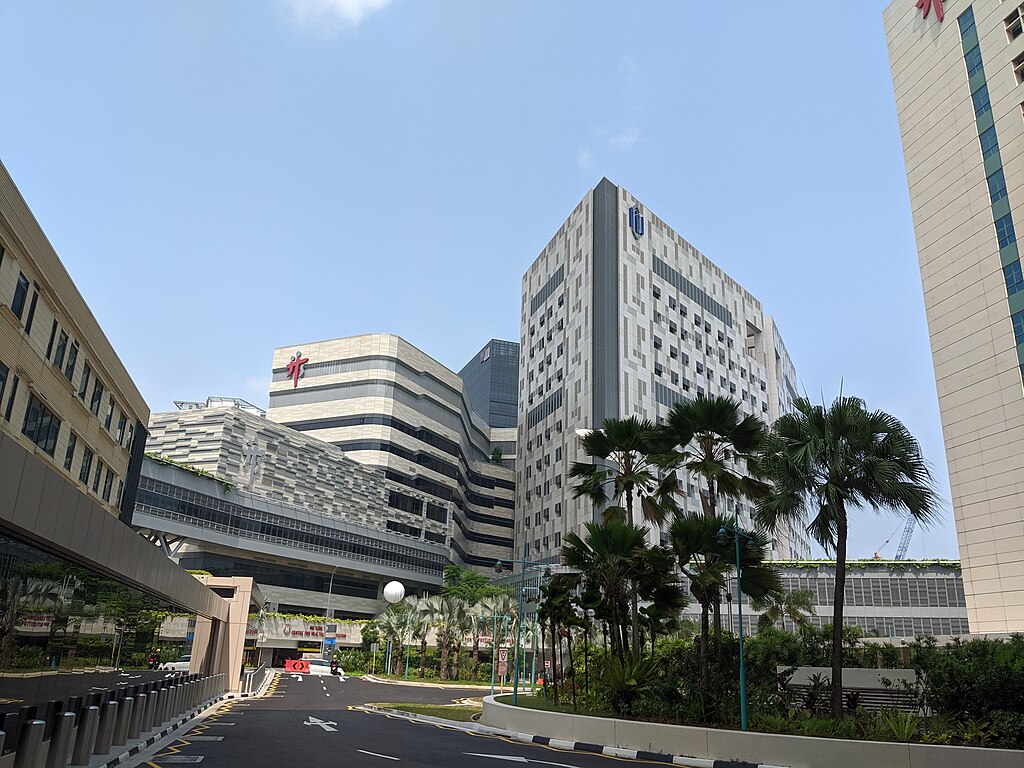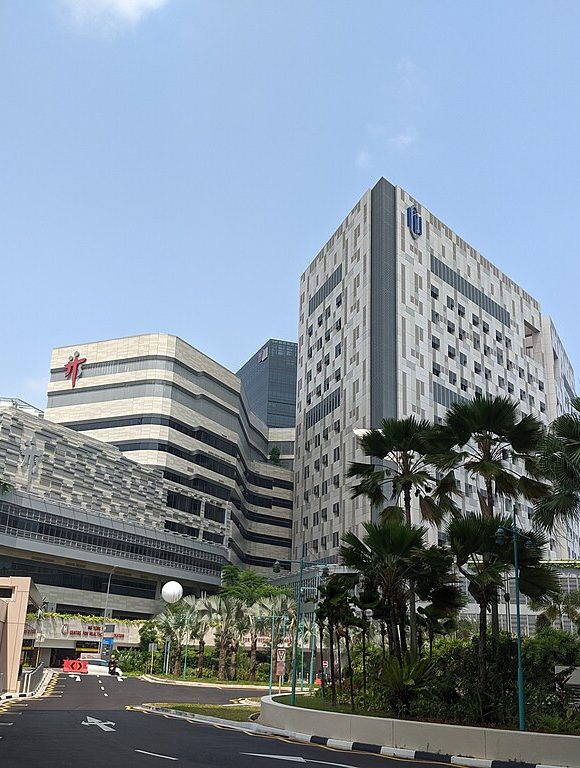
Singapore’s first human challenge study is paving the way for the future of MUSICC’s work.
Singapore has initiated its first human challenge study known as Sing-CoV as described in an article by The Straits Times. The study has been conducted by MUSICC consortium partner the National Centre for Infectious Diseases (NCID) and will feed into their upcoming work as part of MUSICC. Associate Professor Barny Young, who is head of the NCID Clinical Trials Unit, spoke with the Straits Times about this groundbreaking work into global disease challenges and pandemic preparedness. Studies such as this will pave the way for MUSICC as it enters the second year of its five-year lifespan and conducts its first round of human challenge studies.

The National Centre for Infectious Diseases and Centre for Healthcare Innovation in Singapore, site of the Sing-CoV human challenge study – ©TheGreatSG’rean
Human challenge studies involve intentionally infecting healthy participants with a pathogen in a controlled, clinical setting. Pathogens in these studies could be a virus, fungus, or bacteria. On its own this type of study allows researchers to monitor the behaviour of the pathogen within the human body, along with any instigated immune response. A large benefit to this study style is the ability to quickly gather data in a short amount of time due to the fact it is known that individuals have been exposed to the pathogen. In everyday life there are many factors that may affect whether we come into contact with a pathogen, which can create a lot of unanswered questions for researchers. As Associate Prof. Young is quoted in the article: “When we are studying, for example, people with Covid-19… we don’t know how they were exposed, when they were exposed, exactly how much virus they were exposed to, and it’s very difficult to measure those time points afterwards.” Human challenge studies are not a new phenomenon and have been carried out over the past 25 years with rigorous safety protocols.
As reported in the Straits Times, the Sing-CoV trial aims to recruit a total of 20 volunteers by September or October and is the first COVID-19 human challenge study to be conducted outside of the UK. Within the study, volunteers were quarantined for 14 days after deliberately being infected with COVID-19 and they were then closely monitored by staff at NCID. One participant described the experience as better than they had expected, experiencing only mild symptoms.
Associate Prof. Young stated that symptoms experienced by volunteers so far did not require any medication and were mild and short-lived. The study is investigating the Delta strain of SARS-CoV-2, with participant experiences in line with the experiences of participants in other SARS-CoV-2 studies. As the Straits Times further quotes Associate Prof. Young, “around 130 people have taken part in SARS-CoV-2 human challenge studies around the world now… and nobody’s had any severe adverse events, nobody has required antiviral medications or developed a severe infection.”
Infecting willing participants as part of human challenge studies is not the only goal of Sing-CoV. It also aims to target capacity building of this research in Singapore, increasing local expertise to conduct challenge studies there. It seeks to build collaboration between institutions in Singapore and further afield, such as Imperial College London (United Kingdom), led by MUSICC Consortium Lead Professor Chris Chiu, who worked with NCID in establishing their study protocols. Sing-CoV also seeks to establish a human challenge model in Singapore, improving the efficiency of future human challenge studies. The study also seeks to look at the body’s immune response and how we spread the virus into the environment once infected, particularly via our breath, which are also key points of investigation within MUSICC.
Associate Prof. Young is also the institutional lead for NCID within the MUSICC project and explained how Sing-CoV will lay the groundwork for NCID’s work within MUSICC. MUSICC aims to deliver a vaccine trial with a human challenge element, at NCID. The trial will assess the effectiveness of a newly developed COVID-19 vaccine by inoculating participants and then purposefully exposing them to the virus under quarantine conditions. As NCID will also be delivering this vaccine trial in Singapore they are able to draw from their work on Sing-CoV, improving the efficiency and effectiveness of their work on MUSICC.
The same team will be working on the study, carrying all their training and expertise over, and the same facilities can be used, from labs to hospital rooms. The team can also largely carry over many of the same protocols from Sing-CoV to MUSICC, saving great time and effort that would have been required had they been developed them from scratch. Great care is taken when working with viruses and other pathogens due to the inherent risk involved. Robust protocols and highly trained staff ensure these types of studies are carried out safely and participants are exposed in a controlled environment. As Associate Prof. Young explains in the article, “During their stay of up to 14 days, participants are closely monitored by a dedicated healthcare team to ensure they remain well. The risk of developing a severe infection is very small, but should that happen, medical treatment will be given immediately.”
Associate Prof. Young explained how the frameworks developed as part of Sing-CoV also contributes towards one of MUSICC’s key aims, to research transmission-blocking COVID-19 vaccines. MUSICC is investigating mucosal immunity, which is immunity generated at the site of mucosal tissues. Among other places, these types of tissues line our airways and is why mucosal vaccines may be administered by inhalers or nasal sprays.
As part of their work, Sing-CoV is comparing mucosal immunity with systemic immunity. Systemic immunity refers to the body’s overall immune response and so Sing-CoV is comparing the antibodies and immune response within the blood, with that of the mucosal tissues. Even though the body’s immune system is connected, there can be differences in response between specific areas.
On previous COVID-19 vaccines, Associate Prof. Young explained they, “were really good at giving systemic immunity. So, they gave people really good antibody levels and immune responses in their blood, which protected against severe illness. But they didn’t induce immunity in the nose. So, when people were exposed to the virus, they still get infected.” The next generation of COVID-19 vaccines being researched within MUSICC, will look to build immunity within the mucosal tissues. This would then stop the virus from entering the body, preventing infection and transmission entirely.
NCID’s work is a fitting example of the interconnected ecosystem operating across research projects. Associate Prof. Young reflects how it was, “quite serendipitous timing” for the Singapore program, with Sing-CoV and MUSICC coming together at the right time. But the work that NCID and Imperial have done since has been no accident, instead driven by common goals and an eagerness to work across borders.
This not only improves the work of individual institutions but as Associate Prof. Young states, establishes Singapore’s ability as a country to run challenge studies. Singapore could then build on this to evaluate vaccines or other treatments alongside these studies, strengthening the countries preparedness and response to disease.
MUSICC is made up of a large network of international institutions, looking to influence international policy on human challenge studies and pandemic preparedness. As NCID’s work feeds back into MUSICC its effects will ripple through and be amplified by MUSICC’s consortium. Collaboration on this level is instrumental in addressing global health challenges and is only the start of creating widespread positive impacts for society in disease prevention and pandemic preparedness.
You can find more information on NCID’s Sing-CoV trial in the Straits Times online article.

6th August 2025